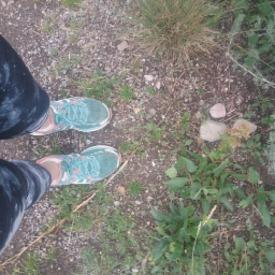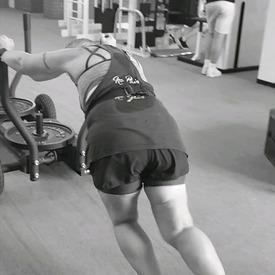Ab work - do you do it?

bebeisfit
Posts: 951 Member
I'm a 57 yr old female who's always had a big belly (no kids). Even in my late 40's at my best fitness level I had a 2 liter, not a 6 pack kind of belly. Apple to the core. ha I used to run, lift and do tons of ab work, still had a big belly - and yes, I know abs are made in the kitchen. I considered myself at goal at the time, I'm currently 10 pounds from my goal weight now.
I spend about 45 min at the gym most days, currently do strength training 3 times a week, and the rest cardio. I skip the ab stuff unless I'm in an occational bootcamp or yoga class.
Question is..do you do them, do you find a benefit? And what's the routine?
I spend about 45 min at the gym most days, currently do strength training 3 times a week, and the rest cardio. I skip the ab stuff unless I'm in an occational bootcamp or yoga class.
Question is..do you do them, do you find a benefit? And what's the routine?
0
Replies
-
-
Nope I don’t. I do a barbell based hypertrophy programme which has a lot of compound lifts eg squat and deadlifts. The person who wrote the programme - Eric helms- says direct ab work is not needed for most people who do this type of programme .0
-
Abs are “made” in the gym and “revealed” in the kitchen. Core strength is very important as we age. At 64, I always try to incorporate a few core specific exercises. I’m limited in what I can do due to neck/shoulder issues, so no crunches and few planks. But there are lots of others. Of course compound lifting hits your core as well. For me it’s about health, not appearance.1
-
I don't, but I'm quite active and a lot of the work I do indirectly hits my abs/core (Pilates, weights, kettlebells, mountain climbers, pole fitness classes etc).5
-
Like others, I lift.
On my alternate days I do aqua fit, yoga and Pilates, they take care of any extra core work.
I found belly dancing gave me my best core workout, but that isn’t offered anymore.
I’ve got, and will probably always have, a good jiggley covering over some decent abs. I’m not dedicated enough, or concerned enough, to try work it off.
Cheers, h.1 -
No, I don't do a lot of ab work. Occasionally I'll jump on the pull-up bar in my kitchen and do some windshield wipers or knee to elbows to make sure I still can, but I play with heavy logs, flip a massive tire, farmers walk heavy, deadlift heavy, and squat heavy - all without a lifting belt, ...among other things. My core gets hit plenty.0
-
I do. I have a plank challenge on my phone and usually do 5 - 6 different variations, held between 45 seconds to 75 seconds, depending on the day. I use those as a warm-up to lifting and a break in the middle of certain sets.
For me, the planks have really helped with yoga, which I do 4 days per week.1 -
Not really. A little bit in yoga class and maybe twice a week I throw in some core work.. only in a deficit though.0
-
Yes. I asked my trainer to give me a program to help me run and swim stronger. It includes some ab work. I swim laps and do water fitness, so that has lots of ab work too. I love having good core strength. We do a lot of work on the pelvic floor in the water fitness class which benefits me greatly after 3 gigantic babies years ago...0
-
I'm 63 and started a few weeks ago to add ab crunches to my daily routine, but, I also try to be mindful of how my abs are my CORE so they have a role to play in just about every thing I ask my body to do.
So....I'm 'engaging' that core every chance I get. I read this trick in a ski magazine for how to engage the core: Imagine holding tight to a $100 bill with your butt cheeks. Yes, I can walk, talk, and sip my cocktail while holding this virtual bill!
I'm hoping that the ab crunchies I do daily will do even a little bit towards reducing the post-obesity saddle bag I'm now sporting.
0 -
Not often. I hit them indirectly a lot with pushups, chinups, and deadlifts I suppose. I probably should do them more often

0 -
Lying down leg raises with snail-pace slow lowering and raising is a killer ab exercise. I do the same with weights. Nothing quickly. Everything is active and controlled on the lifting up and especially on lowering it back down. Nothing is passive in either movement. Same with my legs. People who can do a hundred crunches quickly even find these slower exercises really intense.1
-
I've been trying to get better at incorporating at least one ab workout in with my weight training. Not because I am looking for a six pack, but because a strong core is going to help me with my lifting (and life), belly fat or not. I genetically carry a lot of my fat on my belly, so I'm unlikely to have a six pack without being severely undernourished. It's about more than the aesthetic for me.0
-
Most people fall at the two extremes—either doing a lot of focused ab work (often doing below average exercises), or they follow the “compound lifts are all the core work you need” maxim.
Neither approach is ideal, IMO. Compound lifts are not a complete “core” workout, although they do help. Again IMO, most focused “abdominal” exercises—crunches, planks, twists—either lose effectiveness quickly or just train you to do those exercises better—they don’t train the core that well.
I think the best approach is a combination of compound lifts (done correctly of course) supplemented by a small/modest volume of focused core exercises.
To give an idea of what I think are the “better” types of core exercises:
Pallof press (done correctly—most people do these too fast)
Weighted dead bugs, dead bug w/iso hold
More progressive planks—e.g. long-lever, body saw, reach
Rollouts
Offset rack holds—with step ups, lunges, squats, etc; also various offset carries
Suitcase deadlifts
2 -
I do very little actual ab work (well when compared to everything else I do). Do some sit ups, leg raises etc in class...
...what I do do is compound lifting, which works the core.
Plus I've recently started doing PiYo daily and this week my core is really feeling the love. Lots of planks, down dogs, and balancing is really making itself known0 -
I do, as part of my core work. I need it for back health. My quality of life was worse when I didn't do that. I still manage to get a herniated disc sometimes, but it doesn't happen as often as it used to. My exercises are mostly bodyweight plus bands for certain movements and heavy (for me) jugs for suitcase and farmer walks. My work is usually focused on core endurance more than strength because that's what helps me the most. I never do typical crunches or setups because they kill my back.0
-
Yes I do specific core work including but not exclusively ab work to help support my damaged back - generally the stronger my core the less back problems I get.
Unusually I do a high volume of sit ups and other exercises on a gym ball (virtually cardio for abs) as strength endurance for my core muscles as a long distance cyclist is more important to be me than absolute strength or aesthetics.
One of the few compliments I got from a very high standard but ultra critical cycling mate was on a 100+ mile ride when he said he could see my legs were completely shot but I was still maintaining a stable core. That's why I do it - not to look pretty on the beach!
Agree with @Azdak about the value of Pallof presses, often I can't do rotational exercises and Pallof presses allow me to work my core without grinding my facet joints. You do get sideways looks from fellow gym users who don't really understand what the exercise is doing.
But TBH I wouldn't recommend my routines to the general gym population who don't have the same goals and disabilities as me.0 -
I do some direct ab work at the end of my workout. Not a ton...usually just one movement for how many ever reps and sets my trainer tells me. Usually hanging leg raises, roll outs, or leg lifts and some planking.0
-
Yes I do specific core work including but not exclusively ab work to help support my damaged back - generally the stronger my core the less back problems I get.
Unusually I do a high volume of sit ups and other exercises on a gym ball (virtually cardio for abs) as strength endurance for my core muscles as a long distance cyclist is more important to be me than absolute strength or aesthetics.
One of the few compliments I got from a very high standard but ultra critical cycling mate was on a 100+ mile ride when he said he could see my legs were completely shot but I was still maintaining a stable core. That's why I do it - not to look pretty on the beach!
Agree with @Azdak about the value of Pallof presses, often I can't do rotational exercises and Pallof presses allow me to work my core without grinding my facet joints. You do get sideways looks from fellow gym users who don't really understand what the exercise is doing.
But TBH I wouldn't recommend my routines to the general gym population who don't have the same goals and disabilities as me.
This concurs with the instructions I was given when I strained my SI joint. "A lot of times with back pain we blame tight hamstrings when the real culprit is a weak core."
Unfortunately, I had both problems. Hamstrings engaging when my glutes should have and weak hip flexors. So now I include hip thrusts on leg day and also target my hip flexors when doing core work (instead of deliberately leaving them out like many articles about ab work recommend).1 -
Cori at Redefining Strength has awesome core workouts. I just switched to her program from crunches and notice a big difference. She does a lot of plank variations. Google her...good stuff.1
-
I do some core exercises as part of any weights/resistance routine, but not that much (a few sets of russion twists, or leg raises, or a mix of crunches). Then one pilates class a week which is a good core workout. For me it's again more to support my lower back as the weaker my core gets, the more I suffer from lower back spasms. I've been spasm free for about 12-18 months now, which is bliss.
The belly only goes down (albeit slowly) when I'm in a deficit.0 -
Theoldguy1 wrote: »I will look for exercise variations that don't have me seated or lying on a bench that reduces core engagement. As an example standing cable row a opposed to seated.
 https://youtu.be/XqXemUOEOu4
https://youtu.be/XqXemUOEOu4
This is another way to incorporate “core training” into one’s “regular” routine.
However, one thing that people need to realize is that there is a trade off—you won’t get as strong doing this type of exercise. The process of “destabilizing” to make the core work harder lowers the amount of weight you can effectively lift.
That doesn’t mean anything negative—there are many reasons to include exercises like this in your routine, and I have done this specific exercise dozens of times with clients. It just means—as always—you have to make sure the exercises you choose are compatible with your goals.
2
This discussion has been closed.
Categories
- All Categories
- 1.4M Health, Wellness and Goals
- 398.2K Introduce Yourself
- 44.7K Getting Started
- 261K Health and Weight Loss
- 176.4K Food and Nutrition
- 47.7K Recipes
- 233K Fitness and Exercise
- 462 Sleep, Mindfulness and Overall Wellness
- 6.5K Goal: Maintaining Weight
- 8.7K Goal: Gaining Weight and Body Building
- 153.5K Motivation and Support
- 8.4K Challenges
- 1.4K Debate Club
- 96.5K Chit-Chat
- 2.6K Fun and Games
- 4.8K MyFitnessPal Information
- 12 News and Announcements
- 21 MyFitnessPal Academy
- 1.6K Feature Suggestions and Ideas
- 3.2K MyFitnessPal Tech Support Questions

 https://www.youtube.com/watch?v=_xdOuqokcm4[/yt]
https://www.youtube.com/watch?v=_xdOuqokcm4[/yt]

















